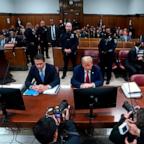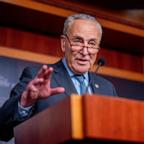How the Cubs went from a mostly average team to a powerhouse
— -- It happened long before Kyle Schwarber's majestic home run ball came to rest atop the right-field video board. ... Long before the Champagne sprayed in the night and the Chicago Cubs partied on the grass at Wrigley Field. ... Long before the Cubs sent the mighty St. Louis Cardinals and Pittsburgh Pirates home for the winter.
It happened on the morning of July 26 to be exact. The Cubs awakened that morning to the sting of Cole Hamels' no-hitter the day before. They were about to get swept, inexplicably, by the worst team in baseball (the Philadelphia Phillies) in a three-game series at Wrigley.
So if you knew then that the Cubs were about to turn into the best team in their whole sport, you must have been consulting a Ouija board, not the standings.
They were 51-45, just the sixth-best record in the National League and the 11th best in baseball. Worse than the Nationals. Worse than the Twins. Worse than the Angels. Among others.
But here's what changed that day: Joe Maddon wrote Schwarber's name on his lineup card -- and then kept writing it pretty much every day, against every right-handed pitcher the Cubs would face.
Here's what else changed: The day before, Jake Arrieta had been the losing pitcher in Hamels' no-hitter. His 2.61 ERA was more than a run higher than Zack Greinke's. Could anyone have known then he was about to embark on possibly the greatest two-month run by any starting pitcher who ever lived?
And it would take another 12 days for one final piece to wiggle into this puzzle, but it was a game-changer. On Aug. 7, Maddon called the Cubs' longtime shortstop, Starlin Castro, into his office and delivered this news: He wasn't going to be the shortstop anymore. Addison Russell took over that day. And the rest is history. Literally.
Schwarber. Arrieta. Russell. It's easy to see what they mean to this group now. But it's much cooler to look back in time and examine how they transformed the Cubs into a team that heads into the National League Championship Series as the Vegas favorite to win the World Series. So let's take that look.
Kyle Schwarber
Think about this. Think about how quickly Kyle Schwarber has ascended to this place, in this moment.
Exactly two weeks before Maddon began playing him virtually every day, he was the MVP of the Futures Game. Only 13 months before that, he was hitting home runs for the Indiana Hoosiers in an NCAA regional final. And now, laughed one AL executive this week, "He's like freaking Babe Ruth."
At 22 years old, he's already launched three postseason homers. The only players in history to hit more before turning 23: Mickey Mantle, Miguel Cabrera, Bryce Harper and Andruw Jones. Seriously. And no other player has ever won an MVP award in the Futures Game and hit a postseason home run in the same year.
"It's all happened really fast," Schwarber said this week. "Like I always say, it's just a blessing to be here."
But considering how he was viewed before the 2014 draft, it's even more astonishing. Most teams looked at him as a defensively suspect masher who was likely to go somewhere between 14th and 20th in the first round. The Cubs didn't agree. So they took him fourth.
"I'd say 75 percent of the industry thought he couldn't catch," said an exec of one team that scouted him heavily. "And if he couldn't catch and he couldn't play first base or left field, then you're drafting a DH first, which you just don't do."
But the Cubs loved the bat, thought he was way more athletic than most clubs and nailed this pick. Then, after just 147 minor league games, they took another chance -- by calling him up in July and deciding his bat and his presence were so special, he needed to play. Period.
Is it just a coincidence that since July 26, they have the best record in baseball (50-21 if you count the postseason)? Or that they've gone 37-17 in games Schwarber has started since then? Or that they scored the second-most runs in the National League from that day to the end of the season?
Not when you consider how Schwarber has torched right-handed pitching. Only four NL players with at least 200 plate appearances had a better OPS against right-handers than he did this year (.953): Harper, Joey Votto, Carlos Gonzalez and Paul Goldschmidt. Oh. Them.
And even more powerful was how Schwarber's presence changed the shape of the Cubs' lineup. Before the All-Star break (when he played just six games), the Cubs ranked 23rd in baseball in OPS against right-handers (.683). But after the break (when Schwarber became a fixture), that OPS went up 100 points (to .783), and they ranked third in baseball.
"With him, it's not just the power bat," said the same exec. "It's hittability. You've got guys like Joey Gallo with big power, but when they get up here, they have holes, they have a tough time and they have to go back and figure it out. But not this kid. He's tough to pitch to."
Well, here's a related development. So are the Cubs these days.
Jake Arrieta
On Jan. 22, 2003, just eight weeks after he became the general manager of the Boston Red Sox, Theo Epstein scooped a guy out of baseball's bargain bin who became slightly more than he (or anyone) bargained. His name was David Ortiz. He almost won an MVP award two years later.
On July 2, 2013, Epstein found another future star in the bargain heap. Will the trade the Cubs made with Baltimore that day -- Scott Feldman for Jake Arrieta (plus Pedro Strop) -- be looked at eventually the same way we now look at the Red Sox signing Big Papi after the Twins non-tendered him? We'll let you know. But it's two years later. And if Arrieta finishes worse than second in the Cy Young voting, it'll be an outrage.
No need to run through all the different elements that have turned this man into one of the most dominant pitchers in baseball. The revamped delivery. The slider/cutter monster. The devastating way he locates his fastball all over the zone. The off-the-charts conditioning routine. The visualization techniques. It's all been documented.
But it's still mind-blowing.
"The stuff was always good," said one NL scout. "But now it's his confidence that strikes me. He's not a guy who's out there trying to make pitches. He just does. He just makes them. He has the ability to repeat his delivery and feel his release point with every pitch. So he just locates 'plus' stuff wherever he wants."
And the result has been a stretch of brilliance that didn't merely change Arrieta's season. It changed his team's season. Even with the four earned runs he allowed in his NL Division Series start, Arrieta's past 14 starts (counting the postseason) still compare with the best 14-start stretch of Bob Gibson's famed 1968 season:
And now consider what it means to any team to have a pitcher who literally never loses. In the two and a half seasons before Arrieta became a Cub, the Orioles had a .486 winning percentage (18-19) in games he started. That was the guy the Cubs traded for. In the two and a half seasons since he arrived in Chicago, the Cubs are 47-22 (.681 winning percentage), counting the postseason in Arrieta's starts. That's the guy they got.
But since the start of August, the Cubs are 14 games over .500 (14-0) when Arrieta starts -- and just 13 over (32-19) when anyone else pitches.
"That's unbelievable," catcher David Ross said, when that record was spelled out for him. "That's why we expect to win. I mean, it's now a proven thing. You prove yourself throughout the year, what kind of team you are and all that. But when you have a guy who goes out there and wins 99 percent of the time, you expect to win. And that's a great thing. When your players expect to win, that's the goal."
Well, why wouldn't they expect to win when their ace pitches? That's all they ever do.
Addison Russell
OK, time for another Life of Theo comparison, courtesy of ESPN research whiz Paul Hembekides. Four months into the 2004 season, the Red Sox shocked America by trading Nomar Garciaparra with moments to go before the trading deadline -- and replacing him at shortstop with Orlando Cabrera.
"We weren't going to win a World Series with our defense," Epstein said that day.
Now here we are, 11 years later. And four months into the 2015 season, Epstein's Cubs abruptly pulled the plug on a guy who had played 844 games at shortstop -- Starlin Castro. And all of a sudden, Addison Russell was no longer their shortstop of the future. He was their shortstop of the present.
Just as Cabrera dramatically upgraded shortstop defense in Boston in 2004, Russell instantly transformed the position for the Cubs. The numbers, as compiled by Hembekides:
? From the day he took over (Aug. 7), Russell led all shortstops in baseball in defensive runs saved (11), according to Baseball Info Solutions.
? Before Aug. 7, the Cubs ranked 20th overall in baseball in defensive runs saved (with minus-13). After they moved Russell to short, they ranked third (with plus-31).
? After the date Russell shifted to short, the Cubs converted 55.5 percent of all ground balls into outs, the fourth-best rate in baseball. Before that, they ranked 11th (with 52.8 percent).
? Arrieta might have been the biggest beneficiary of that upgrade among the pitching staff. Once Russell was installed at short, the rate of ground balls converted into outs behind Arrieta jumped from 60.3 percent to 68.2 percent.
? And Russell made a big impact on Kris Bryant's defense at third, too. Bryant's defensive runs saved trampolined from minus-3 before Aug. 7 to plus-17 afterward. And the left side of the infield as a whole went from minus-4 before Russell's move to plus-38 afterward -- the best left-side defense in baseball over the last two months.
"So that one particular move right there," Maddon said this week, "probably, more than anything we did this year, set us up for this moment."
And that's why the loss of Russell for this NLCS, with a hamstring strain, is a potentially major development. Javier Baez, who will replace him, is an excellent defender. But Russell is an extraordinary talent, with exceptional polish and a unique feel for the game.
Did we know two months ago that he would have this powerful an impact? Did we know two months ago how he, Schwarber and Arrieta were about to rewrite the Cubs' entire script? How could anyone have known? But we're now halfway through October -- and this isn't the team Cole Hamels no-hit anymore. Even scarier, it might never be again.




